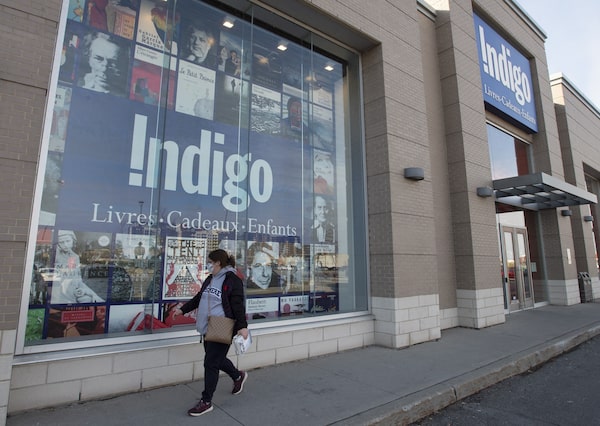
A person walks past an Indigo bookstore in Laval, Que. on Nov. 4, 2020.Ryan Remiorz/The Canadian Press
Indigo Books & Music Inc. IDG-T is considering a proposal from its largest shareholder to take the company private, following a tumultuous year that included a debilitating cyberattack, the departures of board members and senior executives, and mounting financial losses.
The offer comes from Onex founder and chairman Gerry Schwartz, Indigo’s controlling shareholder and member of the company’s board. Mr. Schwartz’s personal holding companies, Trilogy Retail Holdings Inc. and Trilogy Investments LP, announced on Thursday that they had made a non-binding privatization proposal to acquire all of Indigo’s common shares they do not already own, for $2.25 in cash per share.
Indigo founder Heather Reisman returned just months ago as chief executive officer, promising “a major transformation process” at Canada’s largest bookstore chain, which has lost money in four of its past five fiscal years.
Ms. Reisman, who is married to Mr. Schwartz, had retired from the top job in the fall of 2022, though she stayed on as executive chair of the board. Then last June, Indigo announced that Ms. Reisman would retire from the board in August. In the same press release, Indigo announced the resignation of four board members – one of whom said she had experienced “mistreatment” at the company and had lost confidence in the board’s leadership. Also in June, Reitmans Canada Ltd. announced that it had hired away Indigo president Andrea Limbardi to be its new CEO.
In July, Indigo reported that its losses widened to $50-million in its most recent fiscal year, which ended April 1, 2023. In September, the CEO who Ms. Reisman had hired to replace her, British retail executive Peter Ruis, also left.
Ms. Reisman has said publicly that she believes Indigo’s brand has been moving in the wrong direction, and that books needed to be more central to the stores’ offerings. The company has embarked on a turnaround plan known internally as “Indigo 4.0.″
Indigo became a dominant force in Canadian book retailing in 2001, following a merger with Chapters Inc., then the country’s largest bookstore chain with dozens of superstores and more than 200 smaller stores including the Coles, SmithBooks and the Book Company banners.
But the company faced fierce competition as e-commerce retailing expanded and U.S. giant Amazon.com AMZN-Q moved into the Canadian market. Indigo has coped partly by selling more non-book products – such as tchotchkes, toys, fashion accessories and gifts. But it remains a crucial part of the book-selling ecosystem in Canada, and its recent upheavals have caused concern among Canadian publishers.
Speaking to representatives from the domestic publishing industry during an online question-and-answer session last October, Ms. Reisman committed to shifting Indigo’s strategy, saying she believes books should account for 65 per cent to 70 per cent of Indigo’s sales in the future.
During the session Ms. Reisman also said that she and Mr. Schwartz were committed to Indigo remaining Canadian-owned, and had no plans to sell.
“Not only do we have no intention of selling it, we intend to invest in the business,” Ms. Reisman said. “I can tell you I am committed; your two major shareholders are committed.”
In a statement on Thursday, Trilogy – which already owns roughly 56 per cent of Indigo’s outstanding shares – said its own proposal is “the only transaction” it will pursue.
“Accordingly, Trilogy is not interested in supporting any process in furtherance of an alternative change of control transaction and is not prepared to sell its shares,” the release stated.
Trilogy has already been lending money to Indigo, providing the company with a $45-million credit facility to finance its “seasonal working capital and operational needs,” according to company filings. As of Sept. 30, 2023, Indigo had drawn $43-million on that line of credit, which matured on Dec. 31.
If the proposed transaction is approved, Indigo’s shares would no longer trade on the Toronto Stock Exchange and the company would not be subject to filing public earnings reports.
While together Mr. Schwartz and Ms. Reisman control a majority of Indigo’s shares, the proposal will still require approval from a majority of the shareholders not affiliated with Trilogy, according to a release issued by Indigo on Thursday. Together with Ms. Reisman’s personal holding company HRON Canadian Investments Ltd. and other “joint actors,” Trilogy controls roughly 60.6 per cent of Indigo’s shares.
Neither Ms. Reisman nor Mr. Schwartz were available for an interview on Thursday.
The offer price amounts to a 50-per-cent premium on Indigo’s closing share price on the Toronto Stock Exchange on Jan. 31, and a 40-per-cent premium on the 10-day average closing price of the shares.
Indigo’s board of directors has established a special committee “that will evaluate the proposal and any viable alternatives that may be available to the company and make recommendations to the board,” according to Indigo’s release.
 Susan Krashinsky Robertson
Susan Krashinsky Robertson